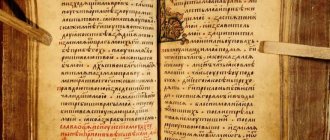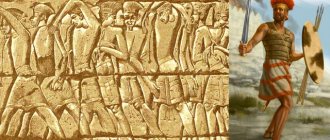Text of prayer Psalm 51
In Church Slavonic
Finally, it was time for David to come to Doik Edomite, and tell Saul, and say to him: David has come to the house of Abimelech.
1 Why do you boast in your wickedness, the mighty one? Lawlessness all day.
2 Thy tongue deviseth lies, for thou hast made flattery a cunning razor.
3 Thou hast loved evil more than goodness, rather than speak truth.
4 Thou hast loved all the words of the flood, a flattering tongue.
5 For this reason God will destroy you completely, will take you away, and will remove you from your village and your root from the land of the living.
6 The righteous will see and fear, and they will laugh at him and say:
7 Behold the man who has not put God as his Helper, but has trusted in the abundance of his riches, and what he can achieve through his vanity.
8 But as the olive tree bears fruit in the house of God, I trust in the mercy of God forever and ever.
9 We will confess to You forever, as You have done, and I endure Your name, for it is good in the sight of Your saints.
In Russian
For execution. David's teaching. When Doeg the Edomite came and told Saul, he said to him, “David has come to the house of Abimelech.”
1 Why do you boast in anger, O mighty one, of iniquity all day long?
2 Your tongue has devised lies, just as you have created deceit like a sharp razor.
3 You loved vice more than good, falsehood more than speaking the truth.
4 You have loved all destructive speech, a deceitful tongue.
5 Therefore God will destroy you completely; May He uproot you and remove you from your dwelling, and let your root be from the land of the living.
6 The righteous will see and fear, and they will laugh at him and say:
7 “Here is a man who did not make God his helper, but trusted in the abundance of his riches, and was strengthened by his vanity.”
8 But I, like a fruitful olive tree in the house of God, have placed my hope in the mercy of God forever and ever.
9 I will praise You forever for what You have done, and I will trust in Your name, for it is good in the sight of Your saints.
Music settings
| Look up miserere in Wiktionary, the free dictionary. |
The Miserere was a frequently used text in Catholic liturgical music before the Second Vatican Council. Most of the tunings that are often used on Tenebrae are in a simple falsobordon style. During the Renaissance, many composers wrote scenery. The earliest known polyphonic setting, probably dating from the 1480s, is by Johannes Martin, a composer working at the Este court in Ferrara.[21] The extended polyphonic setting to Josquin des Pres, probably written in 1503/1504 in Ferrara, was probably inspired by the prison meditation. Infelix ego
to Girolamo Savonarola, who was burned at the stake just five years ago.
Later in the 16th century, Orlande de Lassus wrote an elaborate setting as part of his Penitential Psalms
, and Palestrina, Andrea Gabrieli, Giovanni Gabrieli, and Carlo Gesualdo also wrote settings.[22] Antonio Vivaldi could have written a setting or settings, but such composition(s) lost, with only two introductory motets remaining.
One of the most famous settings of Miserere is the 17th century Version by the Roman School by composer Gregorio Allegri.[23] According to the famous story, Wolfgang Amadeus Mozart, just fourteen, heard the piece one day, on April 11, 1770, and, returning to his lodgings for the night, was able to write down the entire score from memory.[23] A day or two later he returned with his draft to correct some errors.[24] That the final chorus consists of ten-part harmony underscores the wonder of the young Mozart's musical genius. The publication is also notable in that it was erroneously transcribed by William Smith Rockstraw to have numerous high Cs in the ternary part.[25] However, this interpolated version is extremely popular and widely registered.
4 Settings were written by Marc-Antoine Charpentier (H.157, H.173, H.219, H.193-H.193a). Louis-Nicolas Clérambault set one miserère for soloists, chorus and continuo (organ) (date unknown). Sébastien de Brossard set one Miserere
in 1688 - 89 Andre Campra set one
Miserere
in 1726 and many Michel-Richard de Lalande (S15, S27, S87, S41/2, S32/17, S6/3), Costanzo Festa, Johann Sebastian Bach , Giovanni Battista Pergolesi and Saverio Selecci.
Contemporary composers who have written famous settings of Miserere include Michael Nyman, Arvo Pärt, and James MacMillan. References in secular popular music include the Antestor song "Mercy Lord" from the album Martyrium
(1994), "In Manus Tuas" (
Rescue
2003) by Funeral Fog, "White as Snow" (
Winter
2008) by John Forman, "Restore To Me" by Mac Powell and Kandi Pearson-Shelton from
Glory Revealed
(2007). Bukas Palad Music Ministry includes their version of "Miserere" on their album "Christify" (2010).
Verses 12-13 are set to music like a popular Jewish inspirational song. [ by whom?
][
year needed
][26] Called
Lev Tahor
("Pure Heart"), this song is usually sung at
Seuda Shlishit
(third Shabbat meal).[27]
History of writing
During the period of King Saul’s persecution of David, who was still young but crowned king by the Lord, the latter wrote several songs. Psalm 51 is an expression of hope in moments of despair, when many sought the death of David, slandered him and accused him without any reason. The song was written after the high priest Abimelech sheltered David, not knowing what dangers followed on the heels of the young man. Doik the Edomite betrayed Abimelech and denounced him, which was a blow not only for the high priest, who had only shown himself to be a hospitable host, but also for David, who had a hard time experiencing the sorrows of others.
Recommendations
- Parallel Latin/English Psalter/Psalm 50 for (51) Archived July 7, 2022 Wayback Machine Mediumist.net
- Friedman, David Noel, ed. (2000). Erdman Bible Dictionary
. Amsterdam University Press. item 1093. ISBN 9789053565032. - "Catholic Encyclopedia". Catholic Online
. Your Catholic Voice Foundation. Retrieved November 11, 2022. - ^ a b
Guzik, David (2018).
“Psalm 51 – Restoring a Broken and Contrite King.” The indestructible word
. Retrieved November 28, 2022. - Conservative Yeshiva Online. “Is King David a model for Teshuva?” sefaria.org. Retrieved November 28, 2022.
- Wellman, Jack (23 September 2015). "Commentary on Psalm 51 and Bible Study." Patheos
. Retrieved November 28, 2022. - "Luther on Psalm 51 of Pless." logia.org. April 10, 2022. Retrieved November 28, 2022.
- "Midrash Tehillim / Psalm 51" (PDF). matsati.com. October 2012. Retrieved November 28, 2022.
- Abramowitz, Rabbi Jack (2018). "Psalms - Chapter 51." Orthodox Union
. Retrieved November 28, 2022. - ^ a b
Spurgeon, Charles.
"Psalm 51:1". Bible Study Tools
. Retrieved November 28, 2022. - ^ a b
"The difference between a broken heart and depression."
breslov.org
. May 6, 2009. Retrieved November 28, 2022. - Urrutia, Benjamin (1982), "Psalm 51 and the Ceremony of the Opening of the Mouth", Scripta Hierosolymitana
, Hebrew University of Jerusalem,
28
: 222–223 - "The Complete Tanakh (Tanakh) - The Hebrew Bible - The Hebrew Bible with a modern English translation and Rashi's commentary." www.chabad.org
. Retrieved July 25, 2022. - "Tehillim - Psalms - Chapter 51." Chabad.org. 2022. Retrieved November 27, 2022.
- ^ a b c
Brauner, Reuven (2013). "Shimush Pesukim: A Complete Index to the Liturgical and Ceremonial Uses of Biblical Verses and Passages" (PDF) (2nd ed.). pp. 38–39. - Nulman, Macy (1996). Encyclopedia of Jewish Prayer: Ashkenazi and Sephardic Rites
. Jason Aronson. item 317. ISBN 1461631246. - Gonzalez, Shmuel, ed. (December 2010). "Tikkun Chatzot - The Midnight Rite" (PDF). Open the Siddur project. paragraph 11. Received November 27, 2022.
- "Repentance". Daily Tehillim
. Retrieved October 13, 2022. - Kirkpatrick, A.F. (1901). The Book of Psalms: With Introduction and Notes
. Cambridge Bible for Schools and Colleges. Book IV and V: Psalms XC-CL. Cambridge: University Press. item 839. Received February 28, 2019. - See Mullaney v. Wilbur
, 421 U.S. 684, 692-93, 44 L.Ed.2d 508, 515-16, 95 S.Ct. 1881, 1886; (1975). - Macy, page 185
- Caldwell, Grove
- ^ a b
Chisholm, Hugh, ed.
(1911). "Allegri, Gregorio." Encyclopedia Britannica
.
1
(11th ed.). Cambridge University Press. item 690. - Sadie, Grove; Burman, Grove
- https://www.earlymusicsources.com/youtube/falsobordone Early Music Sources / Elam Rotem
- Weintraub, Rabbi Simcha Y. (2018). "Psalms as the best means of self-help." My Jewish Education
. Retrieved November 27, 2022. - "Lev Tahor" Zemirot Database
. Retrieved November 27, 2022.
Interpretation of David's Psalm 51
The main idea of the psalm is a simple truth - sinners will always be punished, and the righteous will be saved. To interpret Psalm 51, one should examine the content and meaning of each verse:
- Verse 1-2 - it says that Doik has planned something terrible and shameful, but sees in this his strength and advantage;
- Verse 3-5 – for sinful thoughts and deeds, Doik will be “destroyed” by the Lord;
- Verse 6-7 - the righteous will see in his punishment an example for themselves, a fate that will overtake all sinners;
- Verse 8-9 – David entrusted himself to the Lord, like all the righteous, and found salvation and true good in him. He promises to always glorify and praise God.
Reading rules
There are no written rules or clear prohibitions for the prayers and songs of the Psalter, but there are still key points that should be known and observed when reading Psalm 51. Firstly, you need to turn to the Lord sincerely, renouncing worldly concerns, for example, when reading a prayer, do not It’s worth remembering whether all planned tasks have been completed. Secondly, it is recommended to read a prayer in front of the icon, as this helps to focus on the words and face of God. Services in churches and temples are conducted in Old Church Slavonic, but at home you can read Psalm 51 in Russian. It is not necessary to learn the text by heart, but you need to know its meaning and purpose.
( 1 ratings, average: 5.00 out of 5)
Uses
Judaism
Several verses from Psalm 51 are regular parts of the Jewish liturgy. Verses (in Hebrew) 3, 4, 9, 13, 19, 20 and 21 are recited on Selichot. Verses 9, 12 and 19 are recited during Tefillat Zakkah
to Kol Nidrei service on Yom Kippur eve.
Verse 17, “Lord, open my mouth,” reads like the preface to the Amidah in all prayer services. Verse 20 says Ashkenazi Jews prior to the removal of the Sefer Torah from the Ark on Shabbat and Yom Tov morning; this is also stated in the Atah Goraisa
(“They showed you”) prayer recited before the opening of the ark on Simchat Torah.[15] in Sephardic liturgy, Psalm 51 is one of the additional psalms recited on Yom Kippur night.[16]
Verse 4 is part of the Ushpizin ceremony on Sukkot.[15]
at Siddur Avodas Yisroel
, Psalm 51 is the Song of the Day for Shabbat Parach and Shabbat Ki Tavo.
This psalm is also read on Wednesday evening after reading Aleinu
at
Maariv
.[15]
The entire psalm is part of Tikkun Chatzot.[17] It is also read as a prayer for forgiveness.[18]
New Testament
Verse 4 quoted in Romans 3:4[19]
Eastern Orthodox
The psalm most frequently used in the Eastern Orthodox and Byzantine Catholic Churches is Psalm 50 (Septuagint numbering) it is called in Greek Ἥ Ἐλεήμων He Eleḯmon
, and begins in Greek Ἐλέησόν με, ὁ Θεός
Eleison me, O Theos
.
in the Daily Office it is pronounced in each of the three units (evening, morning and afternoon).
in the Divine Liturgy it is pronounced by the deacon during the condemnation of the entire church to the conclusion of the Proskomedia, which is also known as the murder of Satan. It is also part of many sacraments and other services, especially as a penitential psalm, during the Mystery of Penance.
in Agpeya, Coptic Church with a book of hours, it is said throughout the day in every office as a prayer of confession and repentance.
Catholic Church
In Western Christianity, Psalm 51 (using Masoretic numbering) is also used in liturgy.
In the Roman Catholic Church this psalm may be assigned by the priest to a penitent as a penance after Confession. Verse 7 of Psalm is traditionally sung as the priest sprinkles holy water over the congregation before Mass, in a rite known as Asperges me
, the first two words of the verse in Latin. This reference gives a striking significance to the Mass as a sacrifice, given that Hyssop was used to apply blood to the lintels during the first Passover.
to the Divine Office, as was traditionally said on Praises for all feriya; then the Reform of 1911 limited this use to Advent and Lent friars. Otherwise it is said as part of the weekly cycle on Wednesday at Matins. in the Liturgy of the Hours, prayed during Praise (Morning Prayer) every Friday.
The passage from verse 17 is often used as the inviting antiphon of the Liturgy of the Hours.
Portions of Psalm 51 are used as a responsive psalm in both the Revised Common Lectionary and the Roman Catholic Lectionary on Ash Wednesday and other days.
In English common law
Miserere has been used for centuries as a forensic test of reading ability. This practice began as a means by which a defendant could claim to be a clergyman and thus be subject only to the ecclesiastical courts and not subject to the authority of the civil courts. This was called imploring the favor of the clergy. The Bible passage traditionally used to test literacy was the first verse of Psalm 51
. Thus, an illiterate person who memorized this psalm could also claim the benefit of the clergy, and Psalm 51 became known as the "neck verse" because knowing it could save the neck by transferring the case from the secular court where it hung was a likely verdict to the ecclesiastical court where both the methods of trial and the sentences imposed were more lenient, for example, a sentence of repentance.[20]




